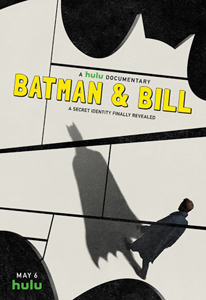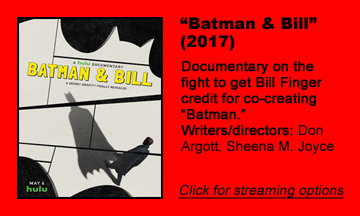“Batman & Bill” (2017, Hulu) is about the fight to correct one of the great injustices of early comic book history – the omission of “Batman” co-creator Bill Finger’s name alongside Bob Kane’s. The documentary weaves from tragedy to fun to hopelessness to delight, avoiding that grim feeling found in most chronicles of injustice, while also contrasting the sweat-shop work process of the 1940s comic industry against this new age when writers are known and celebrated.
Credit where credit is due
The film initially focuses on Marc Tyler Nobleman, who is writing a children’s autobiography about Finger, “Bill the Boy Wonder” (2012), and also working to get DC to give writer Finger (1914-74) a printed credit alongside artist Kane (1915-98) on new “Batman” works.
While that might seem a step removed from what we’re really interested in, Nobleman’s passion is infectious, so we’re happy to have him as our leader in righting a wrong.
Fights against injustice are often draining, but “Batman & Bill” suggests that if you focus on one injustice, it doesn’t have to be such a downer.
Nobleman’s quest reminds me of my dad’s work toward getting Roger Maris’ baseball accomplishments more widely recognized so he will be elected to the Hall of Fame; whether successful or not, it’s an enjoyable project while also being worthwhile on the grounds of morality and justice.
Finger, a man Nobleman never met, is almost like another member of his family, but not in an unhealthy way; a cute home-video clip finds Nobleman’s young daughter announcing that her dad’s job is “Bill Finger.”
Lost to sands of time
The holes in “Batman & Bill” seem more the fault of the passage of time than any oversights by writers-directors Don Argott and Sheena M. Joyce. Both Finger and Kane are dead; Finger kept quiet about the injustice and we don’t know why; and Kane refuted the claims of a 1960s column that publicized Finger’s contributions.
While Kane acknowledged in his 1989 biography “Batman and Me” that Finger is responsible for 50 to 75 percent of Batman’s creation, Kane’s documented talk about the creation of the Caped Crusader in his lifetime is mostly self-congratulatory, to judge by the selected clips – including, ironically, a back-patting fest with Stan Lee.
Argott and Joyce – assisted by wonderful comic-style animations in lieu of a lack of archival material from those days – give us a peek into how Kane came up with the Batman name, but then Finger refined his look into what we know today: the cape, the cowl, the symbol and the gray costume. It’d be nice to know the processes behind the creations of the Joker and other icons, too.
A peek at early comics
But at least we get a sense of the assembly line quality of early comics: Ghost writers wrote the stories from (often sketchy) notes by the creator. While they knew what they were getting into, Finger’s contributions went beyond ghost-writing. This seems to be a case of Kane’s strong personality squashing Finger’s submissive one.

Kane comes off like a cartoon in “Batman & Bill,” giving a viewer plenty to laugh and shake our heads at, while also hating him because Finger was a real victim of his selfishness, and we see how that carried into Finger’s descendants. (Kane’s descendants are absent from the documentary, and there’s no mention that Argott and Joyce sought them out.)
I don’t know if it’s coincidence or endemic to the early days of comics, but the histories of “Batman,” “Superman” and Marvel are all made ugly by people not getting proper credit or compensation for their work.
Not quite world’s greatest detective
“Batman & Bill” focuses a bit too much on the procedure of Nobleman’s amateur detective work – although it’s humorous when he admits that someone telling him about the existence of MySpace in 2007 was clutch in his discovery of Finger’s granddaughter.
Digging into the woman’s backstory – including a dad, Fred, who always hoped his dad, Bill, would get the credit – gets off the story’s beaten path, but it has a payoff: We see how an injustice can affect a family, even if subtly.
In the closing act, I soaked up a lot about copyright law without becoming bored, because the granddaughter’s fight against massive Warner Brothers provides gripping drama. While it is frustrating to know the corporation has the edge even when the facts are on the little guy’s side, it’s also delicious to see justice done in the end.
“Batman & Bill” never emphasizes the financial side, which is partly disingenuous but also effective for keeping the focus on the simple injustice of the missing credit.
Appropriately, Finger’s breakthrough credit comes on a “Batman” film subtitled “Dawn of Justice.”


